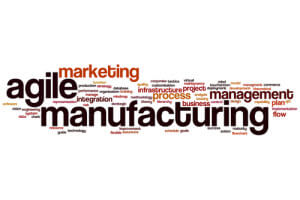Agile Manufacturing Solutions
Manufacturing companies want to operate as efficiently as possible without having to spend too much on labor and overall production costs. While that seems farfetched, there’s a way for your company to operate in an efficient and cost-effective manner. All you have to do is implement agile manufacturing solutions into your business strategy.
What is Agile Manufacturing?
 Agile manufacturing is similar to lean manufacturing. It focuses on eliminating waste and bottlenecks in the workplace to help your business perform as quickly as possible without sacrificing the quality of your product.
Agile manufacturing is similar to lean manufacturing. It focuses on eliminating waste and bottlenecks in the workplace to help your business perform as quickly as possible without sacrificing the quality of your product.
However, agile manufacturing also stresses the importance of customer satisfaction. It’s designed to help companies meet and exceed customer demands by improving production time, operation costs, and delivery time.
Benefits of Agile Manufacturing
Implementing an agile manufacturing strategy in your business will yield great benefits to both your consumers and your company. With agile manufacturing, consumers can receive the products they ordered immediately. It also allows companies to provide more options to better meet each consumers’ specific demands.
In addition, agile manufacturing will help to prevent overproduction and help to reduce operation and labor costs. Since agile manufacturing works to help businesses operate as quickly as possible, it can reduce the amount of waste within the production line, thus reducing storage costs and overall manufacturing overhead costs.
And those reduced costs can help you provide cost-effective solutions to your customers, which can help your business gain a competitive advantage in the market.
How to Implement Agile Manufacturing
 Agile manufacturing has four elements:
Agile manufacturing has four elements:
- Modular product design
- Information technology
- Corporate partners
- Knowledge culture
Each element provides ways to implement a successful agile manufacturing strategy in your businesses.
Modular Product Design
Having a modular product design helps manufacturing companies provide more options. Instead of creating one product as a whole, consider producing parts that can be assembled into specific products. This allows you to make modifications to your products as needed to ensure that your consumers get the exact solutions they want.
Information Technology
Advanced technologies can provide important data, including order information and consumer requests, in real time. Consider adding these types of advanced systems to your production line. With these, workers can create products and adjust any part as needed as soon as they receive the information.
Corporate Partners
Working with corporate partners will give your company an advantage over your competitors. Corporate partners can help you achieve even faster production and delivery times and help you reach new audiences and gain new customers in more locations.
Knowledge Culture
Knowledge culture is the most important element of agile manufacturing. This supports a workplace culture based on rapid change and adaptability. It states that businesses should provide all the tools and training necessary to help workers adapt to changes and accommodate to various types of consumer demands at a moment’s notice.
For more tips on how to improve your business’ performance, read CPV Manufacturing’s post on the Steps to the Ideal Lean Manufacturing System.

